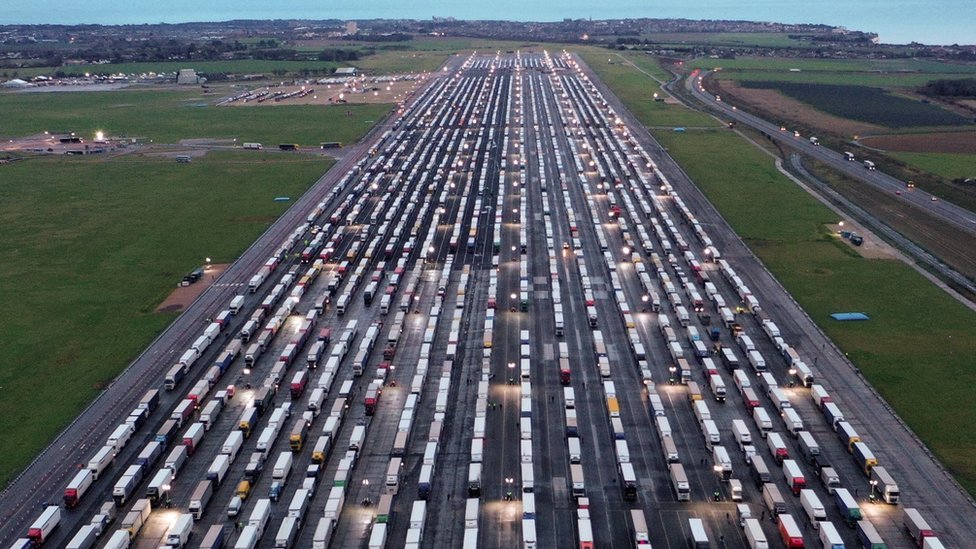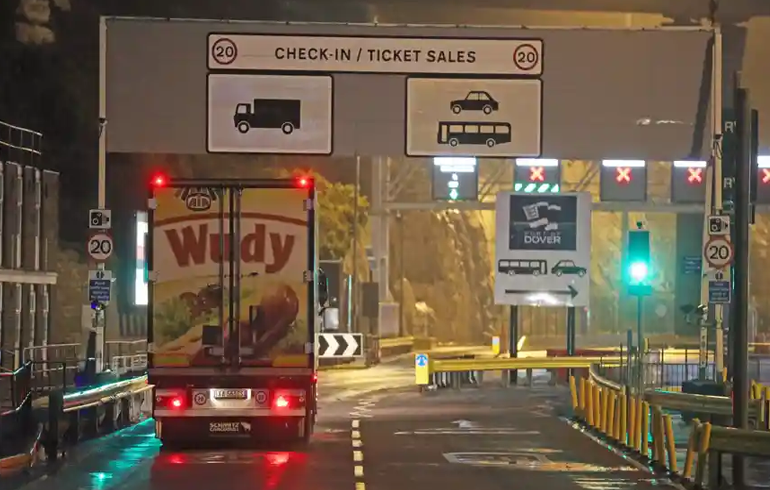Rail, air and sea services between the UK and France are resuming this morning after the French government agreed to ease its travel ban over Covid fears.
French citizens, British nationals living in France and hauliers are among those now able to travel – if they have a recent negative test.
Soldiers have joined NHS Test and Trace staff in Kent to carry out rapid tests on stranded lorry drivers.
Thousands of vehicles have been stuck there since the border shut on Sunday.
The travel ban was imposed on Sunday after the UK government warned of a new, fast-spreading variant of coronavirus and introduced strict tier four – “stay at home” – restrictions across large parts of southern and eastern England in response to a new variant of coronavirus.
The Netherlands and Belgium have also relaxed bans on arrivals from the UK, as long as they have a recent negative result.
But more than 50 other countries, including Italy, India and Pakistan, are continuing to block travellers from the UK.
Under the agreement between the UK and France, those travelling for urgent reasons, including hauliers, French citizens, and British citizens with French residency will be allowed into France.
But in order to travel, they will need to have received a negative test result less than 72 hours before departure.
However, the decisions may come too late for some French and Dutch nationals living in the UK to secure tests in time to get home for Christmas.
Communities Secretary Robert Jenrick said it is likely to take “a few days” to clear the backlog of lorries.
He told BBC Radio 4’s Today programme there were over 3,000 HGVs at Kent’s Manston Airport as of 19:00 GMT on Tuesday, and several hundred more have joined the queue since then.
Asked why the ban was eased, he said Transport Secretary Grant Shapps had argued during discussions with his French counterpart that lorry drivers are “relatively low-risk” because it a “solitary occupation”, and the European Commission’s stance “that member states should not implement travel bans” could “also have played a role”.
And asked whether lorries could be queuing again if Brexit negotiations end without a trade deal, he said: “There’s no reason why scenes like this should happen in the future.”
He added that 80% of the HGV drivers at Manston Airport are from the EU, so “it’s in both side’s mutual interest to bring this to a speedy resolution”.
It comes as:
A “gold command” meeting of ministers and officials considers extending tier four curbs to more parts of England – with changes coming as early as Boxing Day. Sources say places immediately surrounding current tier four areas, largely in southern England, could soon be placed under the toughest restrictions
A further 17 areas in England – from Lincolnshire to Bristol – receive access to rapid mass community testing in the coming weeks to help slow the spread of the virus
Scotland’s First Minister Nicola Sturgeon says “I’m kicking myself” after a photograph shows her breaking Covid rules
And rationing is implemented at the UK’s biggest grocer, Tesco, in a bid to maintain supplies
BBC correspondent Simon Jones said Eurotunnel had said around 150 passenger vehicles had crossed the Channel overnight, carrying people who had had negative tests. Freight traffic had not yet crossed.
The Channel is a vital trade route, with about 10,000 lorries a day travelling between Dover and Calais at Christmas, largely bringing in the freshest produce.
Supermarkets have been warning that the travel ban and subsequent delays at ports could see shortages of certain fresh foods, including lettuces and citrus fruits coming from the Continent.
Mr Jenrick said there will be “multiple testing sites” at Manston Airport and elsewhere, organised by NHS Test and Trace with support from the armed forces “in the first instance”.
Rapid “lateral flow” tests will be used, which can detect the new variant and work like a pregnancy test to give a result in about 30 minutes.
Freight drivers will receive their test result by text, and a negative result gives them the right to cross the Channel.
“If they test positive then they’ll be offered a PCR test and they’ll self isolate, probably in their cab until they get those results,” Mr Jenrick said, referring to the swab tests which take longer to get results.
“If they test positive again then they’ll be offered Covid-secure hotel accommodation nearby, where they’ll go to directly and have to self isolate there.”
He added that hotel accommodation was secured overnight on Tuesday and “should provide enough capacity for the next few days at the very least”.

Testing will also take place on the French side for hauliers entering the UK.
The Netherlands has demanded UK arrivals use so-called PCR tests, which can take over 24 hours to turn around as they require a lab.
Elizabeth de Jong, policy director at business group Logistics UK, said its members were “relieved” to hear the border had reopened.
But she urged officials to set up Covid testing procedures quickly “to ensure divers can be processed and get home for Christmas safely”.
The Road Haulage Association said: “Even if the border is opened up, a short delay in the process is going to mean huge delays in the supply chain.”
Despite the easing of restrictions, UK Transport Secretary Grant Shapps warned hauliers against travelling to Kent until further notice to help alleviate congestion at its ports.
Earlier, the European Commission urged other EU member states to lift travel bans affecting the UK – but said non-essential travel should be discouraged.
A further 36,804 people in the UK have tested positive for coronavirus and there were 691 deaths within 28 days of a positive test, according to Tuesday’s government figures.
It is the largest daily number of cases recorded yet, though it is thought the infection rate was higher during the first peak in spring when testing was much more limited.
Source: BBC




















































